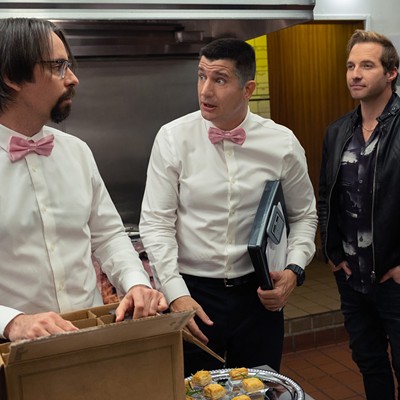Wednesday, September 29, 2010
Let's Fix: "The Event"
"Let's Fix" is a semi-regular feature in which I, a newbie TV
critic who's never constructed a coherent work of narrative fiction (assuming we don't count my "SuperDaniel" stories in second grade), tell professional veteran show-runners how to fix the art
they've spent their lives perfecting. You're welcome, seasoned professionals.
The Event is a mess. Sometimes it's a glorious mess. Most of the time it's an embarrassing mess. But somewhere within the primordial stew of narrative chaos, of 15 different competing premises, of madcap time jumps, an adequate show could miraculously emerge.
You doubt me. If The Event was a shy mousy girl with her hair up and glasses, you would bet me large amounts of money that there's no way I could turn her into Homecoming Queen by the time the "Memories Under The Stars" dance rolls around in October. You may be right. But I believe every show, no matter how messed up, can improve. It can self-actualize, becoming the best little show it could possibly be.
Here are some ways that could happen.
1. Answer the big questions. Now.
What is The Event? You know, the one referred to in The Event
Tip for successful television: If you're trying to set up a big mystery for the season, "What is the Show About" is not a good mystery to begin with.
Mystery works well for movies. Set up the question, give us rising action, throw in a few twists, and then give us the answer. Roll credits. But mystery is problematic for an ongoing television series. Once we find out who killed Laura Palmer or the woman on Wisteria Lane, the rest of the show seems a little... anticlimactic.
Mystery is a foolish foundation to build a serialized show on. Because once it's gone, your show crumbles. And the longer you go without answering that mystery, the bigger the anticlimax when we finally answer the big questions. Nobody wants the punchline to the series-long joke to be "The Aristocrats!"
The Event should immediately answer the pressing questions, the ones that can give some much-needed narrative direction. They should take a cue from the fellow underrated crazy sci-fi drama The 4400, which answered its "what's happening" question in the first season and then proceeded to react to that revelation. The 4400 is a template for how The Event can succeed. Flash Forward is a template for how a show like The Event can fail.
A crazy genre show like this relies on movement. They need a direction to run in first. It can't be "Figure out the thing, whatever the thing is." And it can't be "find my missing girlfriend, Mindy McGuffin, wherever she is!"
2) Give the characters character. By now, it's a cliche to say that great stories are about characters, and not answering questions to mysteries. This leaves out, of course, the crucial nature of plot, vision, and dialogue — all of which are more important than whatever convoluted Wikipedia-ready back story the creators come up with. ---
But interesting characters are the one element that can make a show watchable when all other elements fail. In a popcorn genre show, therefore, iconic characters provide about 75 percent of the entertainment. So it's disappointing to see Blair Underwood — so interesting and textured on In Treatment, play President Bland Palmer here.
We don't need Breaking Bad-level nuanced characters here. I don't believe The Event has the subtlety to pull that off. Instead, we need the best scenery-chewing character actors to play slightly-ridiculous roles. Bring us your Peter Stomares, your Ian McShanes, your Dylan Bakers, your William Fichtners.
Prison Break, Con Air, and Armageddon all rose to "guilty pleasures" because of the fun — and yeah, a little broad — character-acting. The Event should do the same.
3) Stop the time skips. Somewhere, in some editors backroom, some outline floating around, there's a version of The Event that goes chronologically. But now, it's been turned into one of those "Put the Panels in Orders" comics from Highlights for Children. It's a mishmash. In Bank Gothic (a champion among fonts) the screen repeatedly tells us SIX MONTHS EARLIER or THREE YEARS PREVIOUS or FOUR SCORE AND SEVEN YEARS AGO or IN THE YEAR 2525. There are a half-dozen such time switches during each episode.
The result is narrative motion sickness. One flashback is bad enough for narrative coherence and maintaining tone and tension. Six interlocking ones are worse. Stick to two time periods — or fewer — in a single episode, and you might just be able to tell an actual story.
4. Tone down the score. There's a scene in The Event's second episode where a hospital worker receives a phone call saying the man lying on the hospital bed — the protagonist — is a wanted murderer. The audience knows this is a lie, but the woman at the hospital does not. It should be a scene of hold-your-breath tension. But the score pumps in ominous FEEL THE FEELING OF MOUNTING DREAD music. Exactly the wrong scoring for a scene where suspense is aided by the quiet. So many shows trample on their own emotional scenes by blasting feel-this music, and The Event is one of the worst offenders.
5. Try not to interrupt a chase scene through a hospital for a meandering flashback of the guy being chased flirting with a girl five years ago at a swimming pool. That is all.
Tags: Television , TV


















